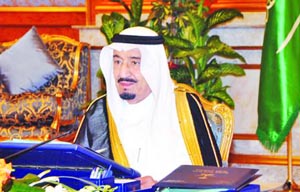Jeddah, June 3: The Cabinet has called on the Non-Aligned Movement (NAM) to assess whether it is playing an effective role in the promotion of security and stability in the world.
The call was made at a Cabinet meeting chaired by Deputy Custodian of the Two Holy Mosques Prince Salman at Al-Salam Palace in Jeddah on Monday.
The Kingdom had stressed this view at the Ministerial Conference of the 17th NAM meeting held in Algiers, said Culture and Information Minister Abdul Aziz Khoja.
The NAM constitutes two thirds of the UN General Assembly membership. It is a group of states that are not formally aligned with or against any major power bloc. As of 2012, the movement has 120 members and 17 observer countries.
The Cabinet condemned the Israeli plan to establish a synagogue in East Jerusalem and build 50 housing units in the Mount Abu Ghneim settlement.
The Cabinet commended the signing of an MoU between the King Abdullah International Center for Inter-Religious and Inter-Cultural Dialogue and the Unesco to promote the culture of dialogue to settle differences, Khoja said.
Prince Salman briefed the Cabinet on the discussions held by Custodian of the Two Holy Mosques King Abdullah with King Mohammed VI of Morocco on greater cooperation between the two countries and the latest regional and international developments, Khoja said.
The Cabinet authorized Prince Salman to conclude a memorandum of understanding for defense cooperation with the Republic of Comoros.
The Cabinet also approved a general agreement of cooperation between Saudi Arabia and the Republic of Gabon, signed in Riyadh on Jan. 14, 2013, aimed at the promotion of economic, trade and investment cooperation between the two countries including the private sector.
The Cabinet authorized the Minister of Transport to discuss and sign with South Korea a draft agreement on cooperation in the field of maritime transport.
The Cabinet also ratified the appointments of Abdul Aziz Al-Quwaiz, Khaled Al-Rajhi and Saeed Garman as private sector members in the Communications and Information Technology Commission (CITC) for a period of three years.
The other appointments approved by the Cabinet include Siraj Bakhurji as director general of water at the Ministry of Water and Electricity in the Eastern Province, Mansour Al-Suwaidan as management consultant at the Ministry of National Guard, and Ali Al-Salman as assistant undersecretary for central services at the Ministry of Finance.





Comments
Add new comment